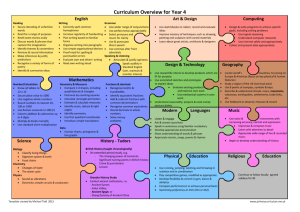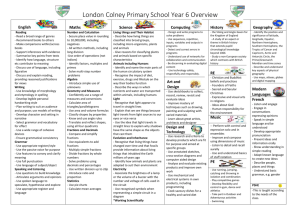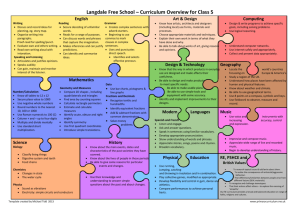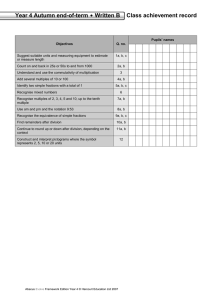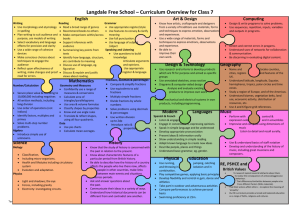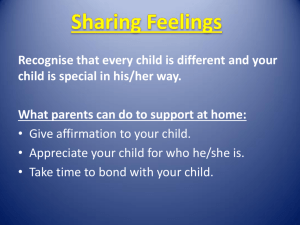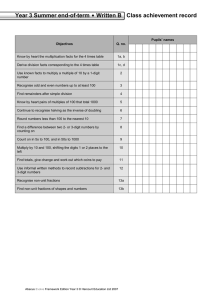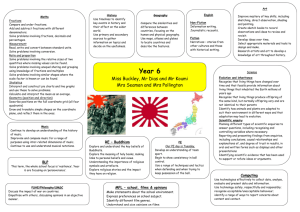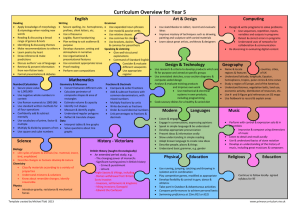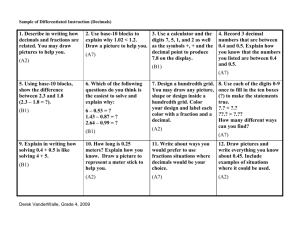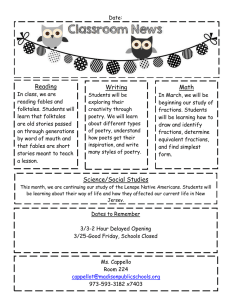Year 4 - Lydford Primary School
advertisement
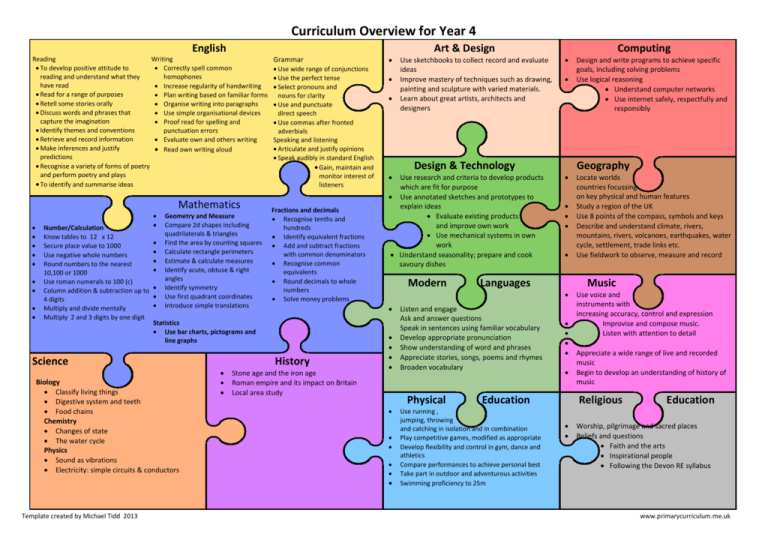
Curriculum Overview for Year 4 English Art & Design Reading Writing To develop positive attitude to Correctly spell common reading and understand what they homophones have read Increase regularity of handwriting Read for a range of purposes Plan writing based on familiar forms Retell some stories orally Organise writing into paragraphs Discuss words and phrases that Use simple organisational devices capture the imagination Proof read for spelling and Identify themes and conventions punctuation errors Retrieve and record information Evaluate own and others writing Make inferences and justify Read own writing aloud predictions Recognise a variety of forms of poetry and perform poetry and plays To identify and summarise ideas Mathematics Number/Calculation Know tables to 12 x 12 Secure place value to 1000 Use negative whole numbers Round numbers to the nearest 10,100 or 1000 Use roman numerals to 100 (c) Column addition & subtraction up to 4 digits Multiply and divide mentally Multiply 2 and 3 digits by one digit Geometry and Measure Compare 2d shapes including quadrilaterals & triangles Find the area by counting squares Calculate rectangle perimeters Estimate & calculate measures Identify acute, obtuse & right angles Identify symmetry Use first quadrant coordinates Introduce simple translations Grammar Use wide range of conjunctions Use the perfect tense Select pronouns and nouns for clarity Use and punctuate direct speech Use commas after fronted adverbials Speaking and listening Articulate and justify opinions Speak audibly in standard English Gain, maintain and monitor interest of listeners Fractions and decimals Recognise tenths and hundreds Identify equivalent fractions Add and subtract fractions with common denominators Recognise common equivalents Round decimals to whole numbers Solve money problems Biology Classify living things Digestive system and teeth Food chains Chemistry Changes of state The water cycle Physics Sound as vibrations Electricity: simple circuits & conductors History Stone age and the iron age Roman empire and its impact on Britain Local area study Use research and criteria to develop products which are fit for purpose Use annotated sketches and prototypes to explain ideas Evaluate existing products and improve own work Use mechanical systems in own work Understand seasonality; prepare and cook savoury dishes Modern Languages Listen and engage Ask and answer questions Speak in sentences using familiar vocabulary Develop appropriate pronunciation Show understanding of word and phrases Appreciate stories, songs, poems and rhymes Broaden vocabulary Physical Locate worlds countries focussing on key physical and human features Study a region of the UK Use 8 points of the compass, symbols and keys Describe and understand climate, rivers, mountains, rivers, volcanoes, earthquakes, water cycle, settlement, trade links etc. Use fieldwork to observe, measure and record Music Education Use running , jumping, throwing and catching in isolation and in combination Play competitive games, modified as appropriate Develop flexibility and control in gym, dance and athletics Compare performances to achieve personal best Take part in outdoor and adventurous activities Swimming proficiency to 25m Design and write programs to achieve specific goals, including solving problems Use logical reasoning Understand computer networks Use internet safely, respectfully and responsibly Geography Template created by Michael Tidd 2013 Use sketchbooks to collect record and evaluate ideas Improve mastery of techniques such as drawing, painting and sculpture with varied materials. Learn about great artists, architects and designers Design & Technology Statistics Use bar charts, pictograms and line graphs Science Computing Use voice and instruments with increasing accuracy, control and expression Improvise and compose music. Listen with attention to detail Appreciate a wide range of live and recorded music Begin to develop an understanding of history of music Religious Education Worship, pilgrimage and sacred places Beliefs and questions Faith and the arts Inspirational people Following the Devon RE syllabus www.primarycurriculum.me.uk
